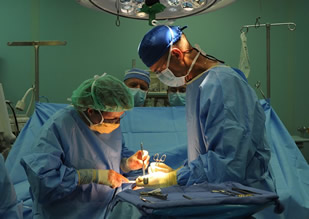Campaign launches to highlight benefits of quitting smoking before surgery

Surgeons are being urged to encourage patients to improve their survival chances by quitting smoking ahead of surgery. The campaign has been launched by the Royal College of Surgeons of Edinburgh (RCSEd) with the support of the health charity ASH (Action on Smoking and Health).
The RCSEd has also written to Secretary of State Jeremy Hunt to highlight this work and ask for his support in ensuring that all patients can access specialist smoking cessation support ahead of surgery. Fewer post-operative complications, shorter hospital stays and better long-term outcomes are some of the evidence-based benefits the College's 14,500 UK members are being asked to highlight to patients.
The campaign encourages surgeons to view patient consultations as 'teachable moments', during which patients may be more receptive to intervention and more motivated to quit. When they discuss the operation, surgeons can use a new patient leaflet published as part of the campaign to outline the significant reduction in risk associated with smoking cessation if they stop at least two months before the operation.
Mr Pala Rajesh, Consultant Cardiothoracic Surgeon at Heartlands Hospital, Birmingham, and Council Member of RCSEd, explained how this works in practice at his hospital trust: “Patients who are admitted to cardiothoracic departments for surgical procedures are routinely questioned about their smoking status. Patients who continue to smoke are counselled and seen by respiratory physiotherapists, introduced to an exercise programme and advised smoking cessation prior to offering their surgical procedure. They are informed of the risks and complications of continuing to smoke. Most patients comply with the pre-operative measures and in the immediate post-operative phase of their fast-track management.
He said that this approach improved the long-term health and quality of life for patients “which is a positive outcome for patients and the health service”.
Following the 2014 RCSEd campaign to highlight the benefits of physical activity in preparation for surgery, surgeons will also be encouraged to work with perioperative medicine teams to increase patients’ fitness for surgery and encourage patients who smoke to quit.
For some operations the risks associated with smoking are so significant that surgeons will not carry out the procedure until a patient has quit. One 2011 study found that smokers were 38% more likely to die after surgery than non-smokers. Following surgery, smokers have a higher risk of lung and heart complications, infection and are more at risk of emergency re-admission.
The RCSEd quit smoking before surgery campaign follows the recent British Thoracic Society (BTS) report ‘Smoking cessation: Policy and practice in NHS hospitals’, which found that 72% of smokers in hospital were not asked if they wanted help to quit while over a quarter (27%) of hospital patients were not asked about whether their smoking status.
Professor Michael Lavelle-Jones, President of the RCSEd, said: "We are delighted to have joined forces with ASH to highlight the significant benefits of reducing or cessation of smoking in the months before surgery. It is important for all consultants to take a few minutes to explain to patients who smoke the risks of continuing to do so before an operation, and to refer them for ongoing support and encouragement through a formal cessation programme."
Deborah Arnott, Chief Executive of ASH said: “It is very encouraging to be working with the Royal College of Surgeons of Edinburgh to support their members in doing more to help sick smokers quit. Smokers’ admissions to hospital provide an ideal opportunity to help them quit and stopping smoking should be seen as an essential part of a patient’s treatment. It is essential that clinicians are able to refer smokers to specialist stop smoking services to give them the best possible chance of quitting.”
The campaign also has the backing of a number of other medical organisations, including the Faculty of Public Health and the Royal Colleges of Physicians, Anaesthetists and Surgeons.
Information contained in this Articles page which doesn’t state it has been written by talkhealth, has been written by a third party, who has not paid to be on the talkhealth platform, and has been published with their permission. talkhealth cannot vouch for or verify any claims made by the author, and we do not endorse any specific products, brands, or treatments mentioned. The content in our Articles pages should not be considered a substitute for medical advice. You should always seek medical advice before changing your treatment routine.
Last revised: 7 February 2017
Next review: 7 February 2020

